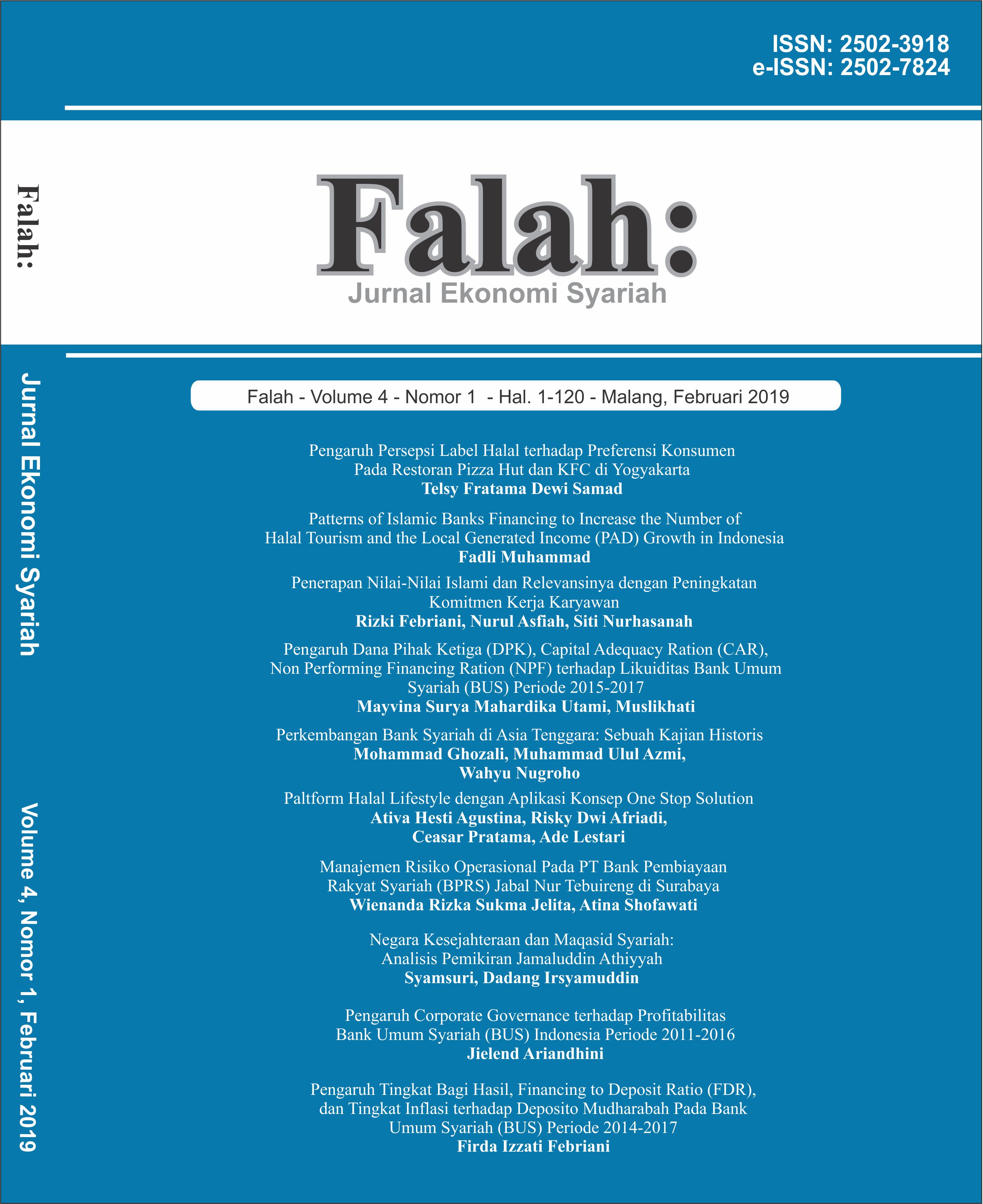Penerapan Nilai-Nilai Islami dan Relevansinya dengan Peningkatan Komitmen Kerja Karyawan
DOI:
https://doi.org/10.22219/jes.v4i1.8493Keywords:
Islamic work ethics, employee satisfaction, affective commitmentAbstract
This study aims to analyze an effect of Islamic work ethics to Islamic work’s satisfaction and affective commitment women employees at restaurant in East Java. The Sample are 76 women employees that work at M2M and D’Mriah restaurant. Data analysis used Smart-PLS and Sobel as a mediation test. Result of this research showed there are positif and significant relationship between Islamic work ethic and Islamic work satisfaction, Islamic work ethic to affective commitment also Islamic work ethic to affective commitment through Islamic work satisfaction. Employees who implementing islmaic work ethic will fell satisfaction higher and this will increase affective commitment to organization. Effect Islamic work ethic directly to affective commitment higher than through Islamic work satisfaction.
Downloads
References
Aditya, Hafid. 2013. Persepsi dukungan Organisasi dan Pengaruhnya terhadap Perilaku Kerja Positif Melelui Kepuasan Kerja, Komitmen Afektif dan Kewajiban yang Dirasakan Pegawai (Studi pada PT Pos Indonesia Malang). Disertasi. Malang. Program pascasarjana Universitas Brawijaya.
Allen, Natalie, John P.Meyer 1990. The measurement and antecedents of affective, continuance and normative commitment to the organization. Journal of Occupational Psychology, volume 63, pages 1-18. Printed in Great Britain. The British Psychological Society.
Altinoz, Mehmet, Demet Cakiroglu and Serdar Cop. 2012. The Effect of Job Satisfaction of the Talented Employees on Organizational Commitment: A Field Research.Journal Procedia Social and Behavioral Sciences. Elseiver.
Armstrong, Michael. 2009. Handbook of human resources management eleventh ed. Philadelphia USA.
Bukair, A. A., Rahman, A. A., Bukair, A. A., Rahman, A. A., Finance, M. E., & Finance, M. E. (2015). Human resource management from an Islamic perspective: a contemporary literature review. International Journal of Islamic and Middle Eastern Finance and Managemen.
Colquitt, Lepine and Wesson.2013. Organizational behavior. USA. McGraw-Hill International.
Elamin, A. M., & Tlaiss, H. A. (2015). Exploring the relationship between organizational citizenship behavior and organizational justice in the Islamic Saudi Arabian context. Employee Relations, 37(1), 2–29. https://doi.org/10.1108/ER-03-2014-0033
Hayati, Keumala and Indra Caniago. 2012. Islamic Work Ethic: The Role of Intrinsic Motivation, Job Satisfaction, Organizational Commitment and Job Performance.International Congress on Interdisciplinary Business and Social Science (ICIBSoS 2012). Social and Behavioral Science. Elsiever.
Ibrahim, Azharsyah Noor ‘Azzah Kamri, Azian Madun and Suhaili Sarif. (2013). Measuring the Islamic Work Ethics: An Alternative Approach. Islamic Perspective on Management: Contemporary Issue, Kuala Lumpur: YaPEIM Management Academy, pages. 135-16
Khan, K., Abbas, M., Gul, A., & Raja, U. (2015). Organizational justice and job outcomes: Moderating role of Islamic work ethic. Journal of Business Ethics, 126, 236–246.
Lambert, Eric G, Bitna Kim, Thomas Kelley and Nancy L Hogan. 2013. The association of affective and continuance commitment with correctional staff life satisfaction. The social science journal. Elseiver.
Marri, Yousof, Arshad Mahmood Sadozai, Hafiz Muhammad Fakhar Zaman, Muhammad Israr Yousufzai & Muhammad I. Ramay. 2012. Measuring Islamic Work Ethics and its Consequences on Organizational Commitment And Turnover Intention An Empirical Study At Public Sector Of Pakistan.International Journal of Management Sciences and Business Research, Vol. 2, Issue 2-ISSN.
Purnama, Catherine, Sesilya Kempa. (2016). Pengaruh Kompensasi dan Disiplin Kerja Terhadap Kinerja Karyawan CV. Cahaya Citrasurya Indoprima. Jurnal Manajemen Bisnis Agora Vol. 4. No. 2. Surabaya.
Rizki, F. T. A. S. (2017). Study on the relationship between Islamic leadership style, work ethics, job satisfaction, and employee performance. Rjoas, 1(61), January 2017, 1(January), 119–126.
Rokhman, Wahibur. 2010. The Effect of Islamic Work Ethic on Work Outcomes. EJBO Electronic Journal of Business Ethics and Organization Studies, Vol. 15, No. 1.
Saadiah, Halimatus, Baharom Mohammad and Sharifah Hayati. (2014).The Role Integrity as Mediator between Work Satisfaction and Work Performance in The Perspective of Islam: An Empirical Approach Using SEM/AMOS Model. Impact: International Journal of Research in Applied, Natural and Social Sciences, Vol 2, Issues 1.
Soleimani, Nader and Behrooz NiazAzar. 2011. A study on the relationship between job ethics with job satisfaction and job stress among the staff of vocational education organization in Tehran. International Conference on Social Science and Humanity IPEDR, Vol.5 (2011) IACSIT Press, Singapore.
Yucel, Ilhami and Cetin Bektas. 2012. Job satisfaction, organizational commitment and demographic characteristics among teachers in Turkey: Younger is better?. Journal Procedia Social and Behavioral Sciences. Elseiver.
Willison, J., & Buisman-Pijlman, F. (2016). Fundamental Islamic perspective of work ethics. Journal of Islamic Accounting and Business Research, 7(1), 63–83. https://doi.org/http://dx.doi.org/10.1108/MRR-09-2015-0216
Downloads
Published
How to Cite
Issue
Section
License
Authors who publish with this journal agree to the following terms:- Authors retain copyright and grant the journal right of first publication with the work simultaneously licensed under a Creative Commons Attribution License that allows others to share the work with an acknowledgement of the work's authorship and initial publication in this journal.
- Authors are able to enter into separate, additional contractual arrangements for the non-exclusive distribution of the journal's published version of the work (e.g., post it to an institutional repository or publish it in a book), with an acknowledgement of its initial publication in this journal.
- Authors are permitted and encouraged to post their work online (e.g., in institutional repositories or on their website) prior to and during the submission process, as it can lead to productive exchanges, as well as earlier and greater citation of published work (See The Effect of Open Access).

This work is licensed under a Creative Commons Attribution-ShareAlike 4.0 International License.


















